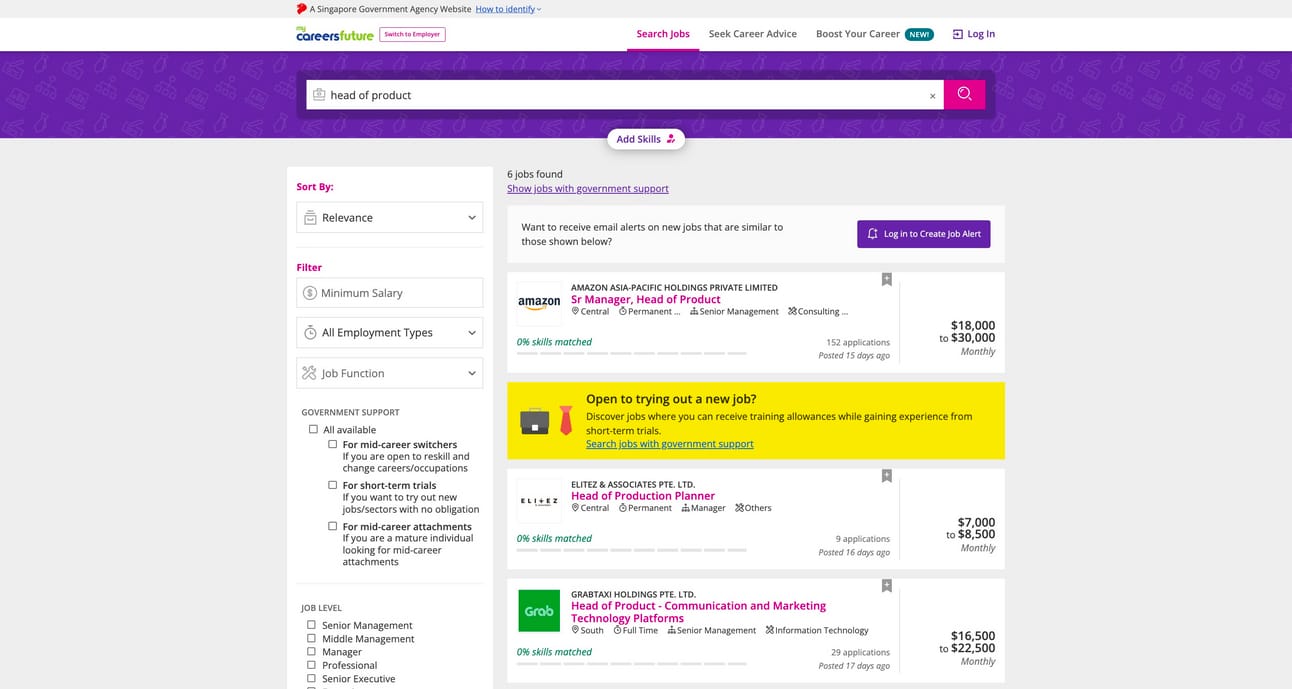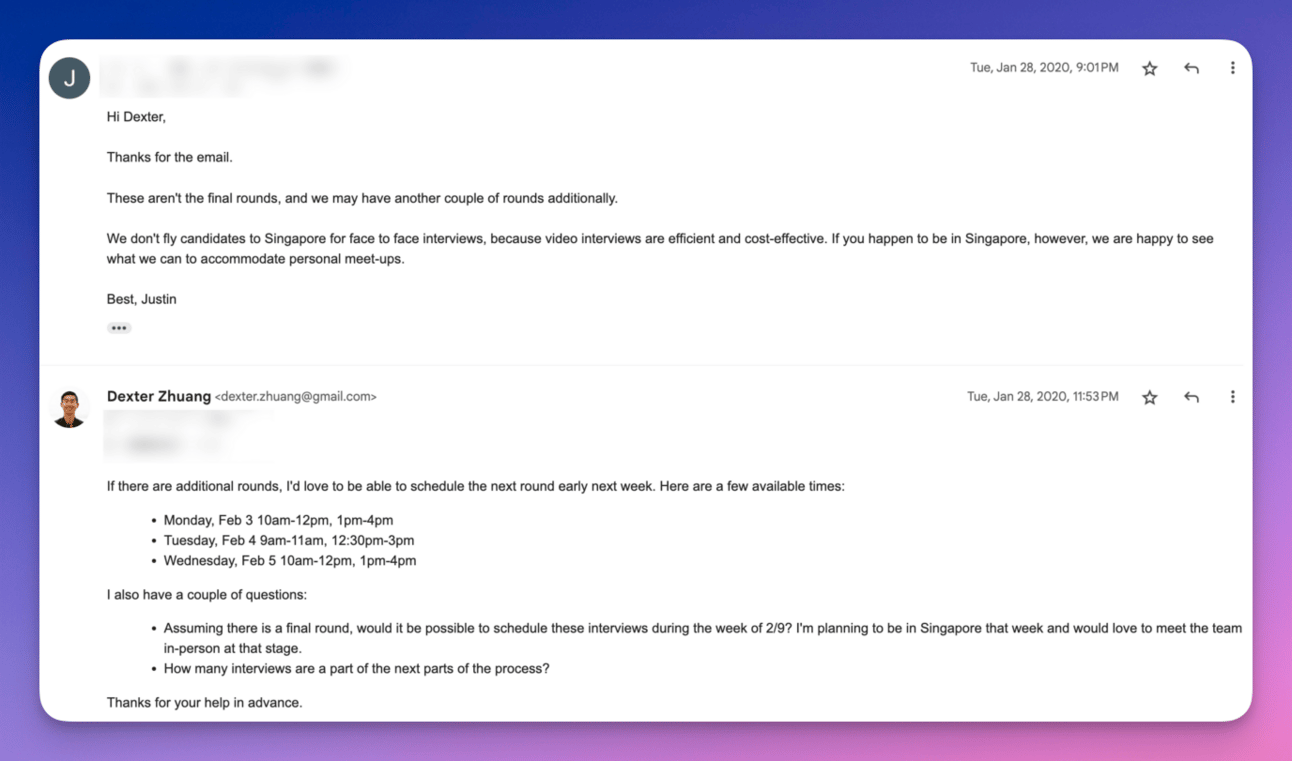I chased a dream and made it reality.
In early 2020, I moved from the US to Singapore and started my new tech job—right before Covid lockdowns.
Here’s a breakdown of the exact steps I took to make this career transition successfully:
Today in 10 minutes or less, you’ll learn:
🎯 How to Define Target Role Criteria & Research the Local Market
🤝 Get the Latest Intel with 30+ Local Connectors
💼 Schedule an Interview Tour & How to Get Comp Data

FROM OUR LABS
😨 You’ll regret not taking this expat investing course

Living abroad is an incredible adventure. 🏖
Yet investing as a new expat feels totally overwhelming.
Your high-flying freedom can quickly turn into a stressful nightmare when you lose thousands of dollars to unnecessary fees and taxes… ❌
That’s why I’ve been building the Expat Investing System (coming in Q4 2023), a course on how to setup a modern investment portfolio that saves you $$$ as an expat.
My goal is turn complex concepts into easy-to-understand strategies that you can use to unlock wins in your portfolio immediately. 💥
Recently, I offered an exclusive sneak peak to 30 select readers. Here’s what a couple had to say:
“Within the first 30 minutes, I learned something new about taxes that will immediately help me save $$.”
“Dexter's expat finance course answered all of our questions and prevented us from making simple errors that could have seriously cost us. A few slides explained concepts we hadn't figured out in 2 years living abroad.”
Want to join us?
👉 Be notified when I launch my full course and don’t miss your chance to claim a one-time-only special offer! Get on the waitlist now.

🧑💻 How I moved from US to Singapore as a tech professional
My timing was lucky.
If I had interviewed just 1 month later, I wouldn’t have been able to interview in-person—nor move to Singapore—due to border restrictions.
It started with a dream.
As a kid growing up in a middle-class immigrant family in Michigan, I had always dreamed of working internationally.
Yet it wasn’t until I had hustled for 7 years in the San Francisco tech industry that I finally found the courage to pull the trigger.
So how did I make this happen?
Here’s the steps I took (and would recommend for any tech worker moving abroad):
Step 1: Decide on your target role, company, and career goals
The first step is developing your initial hypothesis for your job search.
You’ll refine this over time, so it doesn’t need to be 100% correct.
However, you should have a rough sense of your desired role, company, and career goals before executing a search.
How I did this
Here’s the Target Role criteria I considered in my 2019 search:
Role: Given I was on the product management track in the SF Bay Area and I enjoyed it, I sought Product Lead/Head of Product type roles in Singapore
Company: I narrowed down company profile based on stage + industry
Stage: Early (Seed/Series A), Growth (Series B+), Pre-IPO, Public — I picked Growth Stage because I wanted to contribute as a manager/leader, but didn’t want to work in a fully corporate environment.
Industry: Health, Fintech, SaaS — I picked Fintech because I saw this was a rapidly expanding industry and seemed like a unique experience I couldn’t get back in the US (building foundational infrastructure for emerging markets)
Career Goals: I wanted to gain experience in 3 areas: (1) leadership/managing teams (2) building new products (3) emerging markets
I didn’t arrive at this hypothesis instantly. It took me many hours of reflection.
🧠 Lesson: High-Caliber People > Narrow Hypothesis
One lesson I learned in this process was that in emerging markets (unlike mature markets like the US), many industries are still nascent. So if you’re aiming for Growth Stage and up, your company list will end up too small.
The trick is to find excellent people instead. Because the bench in emerging markets is more limited, it’s critical to seek out the teams with the best talent. Don’t get too hung up on your criteria.
Fortunately, this is manageable. In a small community, people talk and word gets around. When chatting with local connectors, ask for recommendations.
Step 2: Research the local market
One challenge when you’re applying for overseas roles is being unfamiliar with the local market.
Do your homework, so you sound like a more serious candidate.
How I did this
After I figured out my hypothesis, I did online research on the local fintech markets.
I paid attention to a few elements:
Trends
Emerging technologies
Competitive landscape
Customer adoption
Financing/IPOs/M&As
My goal was to know just enough to be deadly in future conversations. I didn’t necessarily need to become an expert.

Example: My Southeast Asia market data compilation
Step 3: Reach out to 30+ local connectors, setup chats
After online research, then I suggest setting up real conversations with people on the ground in your target market.
How I did this
I started my search via Linkedin and personal network (college alumni, friends of friends).
I looked for the following profiles:
Profile A: Super connectors (VCs, recruiting agencies)
Profile B: People who made a transition like me (other US tech professionals who moved to Singapore)
Profile C: Local product managers (people in my line of work)
Which profile was the most important in my search?
It depends on the factor
While I owe the job offer I took to the referral from a Head of Talent at a regional VC firm (Profile A), I I found the most value in speaking with fellow Americans who shared their observations of the Singapore tech market and what to watch out for (Profile B)
Note: This was in 2019, when the Southeast Asian tech market still felt very opaque. Particularly in terms of company/product culture, compensation, stock option packages, etc.
I sent ~50 cold emails and Linkedin DMs to people across these profiles.
If there was a fit, I also asked for a referral or intro to the hiring manager for open roles.
Out of ~50 messages:
~60% responded
~30% or 15 people engaged in an informal chat
~15% of 8 people referred me to companies
I learned so much from these conversations, which helped me tailor my job search strategy (and get referred to my last employer!).

Example: My outreach tracker
Step 4: Apply to job postings and schedule virtual interviews
Now you’ll start curating a list of local job postings and identify the top 5-10 roles you want to apply for.
For the first few interviews, it’s fine to do them virtually. Even if you’re a local candidate, you’ll probably be interviewing virtually anyway.
How I did this
In December 2019, I held my informal chats while my then-girlfriend (now wife) and I were traveling in Latin America. In parallel, I collected a list of open roles.
Here’s where I sourced roles:
Referrals from informal chats (see Step 3)
Online job boards (Linkedin, Indeed, local job boards like MyCareersFuture)
Investor networks (Regional VCs)
However, recruiters had already taken leave for the winter holidays.
So I waited until January to apply to these roles. All in 1 batch.
Most companies ran an interview process with multiple rounds:
Recruiter screen
Hiring manager screen
Case/behavioral interviews
Final interview

Step 5: Schedule an in-person interview tour for final rounds
In emerging markets like Southeast Asia, meeting face-to-face is critical to doing business.
The reality is I rarely see foreigners receive a compelling job offer without showing up at the local office.
If you’re applying for roles in markets with similar dynamics, then ask for an in-personal final round interview.
How I did this
I scheduled a 2-week interview tour in February 2020:
I packed as many in-person interviews as I could handle in Singapore & Jakarta
How did I make this happen? I was aggressive about requesting in-person meetings, instead of virtual interviews
Covid restrictions were just starting to get implemented, so I had hiring managers bail on in-person interviews last minute and ask to meet virtually instead anyhow
I flew in and out from my wife’s family’s home in Sydney
Logistics were a nightmare. Yet, totally worth it.
While I can’t be 100% sure, I’m confident that meeting teams in-person was critical to sealing the deal.

Emailing recruiters to setup my interview tour

Lunch break with a friend during my SG interview tour
Step 6: Adapt compensation expectations to local market
If you’ve made it this far, that means you’re close to the offer stage.
Every market has unique compensation dynamics. I’d suggest tailoring your expectations based on the local market.
How do you find out local market expectations?
How I did this
I used a few different sources to triangulate my compensation expectations:
A) Informational Interviews
Remember how we scheduled informal chats with local connectors in Step 2?
During the calls, I shared my own hypothesis of the compensation range for my target role (Series B+ Company Head of Product/Product Lead) and asked my contacts for feedback if I was on target or offtrack.
I was surprised by how receptive they were to sharing their views on current benchmarks, which gave me valuable insight into the market.
B) Online Job Listings
I was applying for roles in Singapore, where some job boards shared compensation ranges (Indeed, Mycareersfuture)
C) Online Peer Reviews
I took at a look at sources like Glassdoor, Levels.fyi, Payscale, etc. but the data was fairly sparse.
The best source of information by far was (A) Informational Interviews. However, the other two sources also helped validate their anecdotal data points.
🧠 Lesson: Be prepared for opaque comp discussions
In my case, I navigated a wide variance in compensation for startup roles in Singapore. While some roles afforded a budget close to US tier 1 city salaries (San Francisco), others landed at 40% less.
This was one of the most challenging parts of the job search. In my experience, SEA recruiters divulged very little information on salary and stock option packages until the end of the process (sometimes never).
This was a sharp contrast to my experience with SF recruiters who shared upfront the salary and stock option budgets.
I only felt more confident after having 10+ conversations with people who gave me anecdotal insight into comp expectations for my role.

🌐 Beyond your borders
💻 Best international locations for expat remote employees (link)
🚀 Ranking the best passive income investments (link)
🏡 Where the housing bubbles are around the world (link)
🧑💻 Jason Cohen (founder of 2 unicorns) writes an insightful newsletter for 33k+ entrepreneurs who love thinking about strategy, startups, product, marketing, decision-making, and founder psychology. Join now! → (link)*
*this is a sponsored link

📆 How I can help
That’s all for today!
Whenever you’re ready, here’s how I can help you:
Work with me 1:1 - Book a coaching or discovery session for your career and wealth goals.
Sponsor this newsletter - Promote your business to 5k+ tech professionals and founders.
Join my course waitlist - Learn expat investing 101.


